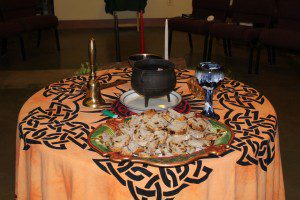In my contribution to the recent discussion on polytheistic theology, I made several references to worship:
Do you worship Poseidon or do you worship The Sea?
Both are beautiful and powerful and I stand in awe of both. It seems reasonable to me to worship both.
If you say “I’m a polytheist: I worship The Land, The Sky and The Sea” then I have no argument with you even though your approach is not enough for me.
The more I work with the Gods as individuals – the more I pray, worship, meditate, make offerings and especially the more I listen to Them – the more Their reality is evident to me and the more meaningful my life becomes.
In the comments, Y.A. Warren asked for my definition of worship. My answer was “the expression of honor and devotion to that which we find most worthy.” I think that’s a useful definition, but the question really deserves a deeper exploration.
 The dictionary definition of worship lists its common meaning: “reverence offered a divine being or supernatural power.” What is more helpful is the word origin: “from Old English weorthscipe worthiness, respect, from weorth worthy, worth + –scipe -ship.” Worship, at its core, is an expression of respect and a statement of worth.
The dictionary definition of worship lists its common meaning: “reverence offered a divine being or supernatural power.” What is more helpful is the word origin: “from Old English weorthscipe worthiness, respect, from weorth worthy, worth + –scipe -ship.” Worship, at its core, is an expression of respect and a statement of worth.
As a polytheist, a UU, and a religious liberal, it’s not my place to tell you the proper way to express your respect, nor what is worthy of it. As a Druid and a priest it is my place to describe forms of worship that have been found useful, and to hold a mirror to forms of worship that have been found unhelpful.
Who you worship, what you worship, and how you worship is an important decision that is ultimately yours. It deserves your mindful consideration.
What worship isn’t
Worship is not celebration. Dancing the Maypole is not worship. A Lughnasadh feast is not worship. These are religious activities and they can be very worthy activities. But there is no expression of honor and devotion, no offering of reverence.
There was a time when many UU churches, uncomfortable with the Christian connotations of worship, called their Sunday services “the Celebration of Life.” I imagine some still do, but most I’ve been around have returned to calling it worship. Celebrating life is good, but there is also a need to recognize and honor something greater than ourselves – whether that something is seen in a theistic sense or not.
Worship is not submission. Now certainly, if your view of the Divine is that your God is all-everything and we are scum, then your worship will likely involve submission. But if you agree that every creature has inherent dignity and worth – and sovereignty – then there is no reason why a heart-felt expression of honor and devotion need include submission, much less self-deprecation.
The Gods are greater than us – they are older, stronger and wiser. It is proper for us to acknowledge their greatness in our worship. But in my experience, they do not have fragile egos that need constant praise and they do not want sheep for followers. We have sovereignty before the Gods even if we are not their equals. Render honor and respect, not submission.
There are some Pagans who say they are called to submit, who say they are owned by a deity. It’s not my place to challenge that relationship. I simply say it is not common and has not been part of my experience.
Worship is not appeasement. The idea that the Gods are obsessed with your sins is just as unhelpful as the idea that the Gods are here to make your life easier and more fulfilling. Both good things and bad things usually have ordinary causes and the randomness of life is just that – random. The Westboro Baptist Church doesn’t just have bad politics and a complete lack of compassion, they have bad theology too.
Now, if you have offended a God you will need to make amends. “I didn’t mean anything by it” is no excuse. Some Pagan traditions have rules of purity that must be followed. Some deities require certain offerings or reject others. Oath-breaking or geis-breaking – intentional or not – is particularly serious. “I’m sorry, I won’t do it again” is a good start, but it’s rarely enough… but that’s another post for another time.
Deity-centered worship
Pagan worship is nothing if not diverse. My intention is neither to list every form it takes nor to attempt to force it all into some ill-fitting universal template. This is my worship and the worship of many other polytheistic Pagans.
Morpheus Ravenna had an excellent post last month titled “Gods with Agency: Ritual theory for polytheists.” I think worship rituals can have more goals and take more forms than Morpheus proposes, but I’m in strong agreement with her basic premise: the Gods are real, so we should treat them as real beings with their own wants, needs, areas of responsibility and especially with the ability to choose what they will and won’t do. Morpheus says:
If our Gods are real, and They have agency, They are making a choice whether or not to respond to our calls. They are making a choice whether or not to engage, to help us, to be present. We can’t be treating them like a tool you put back on a shelf when you don’t need it, and then expecting Them to come and wield Their agency for our benefit!
Since the Gods are real and they have agency, we invite them to our worship ceremonies. We neither command them nor assume they’ll just show up. You wouldn’t summon the head of your order or the originator of your tradition to a ceremony, even if it was in his or her honor. This is part of the hospitality of Pagan worship.
If you were inviting a honored guest into your home, you’d clean the house and you’d dress up. You’d set out some of her favorite things. You’d play his music. And you’d offer her food and drink – not as a sacrifice, but as an act of hospitality. We honor the Gods with human hospitality not because we think they’re human, but because as humans that’s the only way we can relate to them.
We offer honor and praise, not because they need to be reminded of how great they are, but because we do.
We’ve discussed the definition of worship but not it’s purpose. The purpose of worship is to form and strengthen reciprocal relationships with the Gods. Sometimes this is a straightforward quid pro quo. More frequently it’s similar to the way we form relationships with other humans – again, not because the Gods are just like us, but because we’re human and this is how we are. We get to know each other, we learn their stories, they see what we’re willing and able to do, and we learn how our interests coincide.
What do the Gods need from us? Perhaps they need someone to tell their stories. Perhaps they need someone to deliver their messages, or simply to let people know they’re still here. More frequently, they need people to help move the world to be more in alignment with their values and their virtues.
Over time our relationships with other people tend to become very casual. However, I find that over time polytheists tend to become more respectful. As I’ve had more direct experience of various Gods and Goddesses I’ve become more aware of just how far beyond me they are. My experiences have moved me to greater awe and greater reverence.
Most of my formal worship revolves around the Gods. But Nature also has inherent dignity and worth. Nature has sovereignty and agency. Nature is worthy of our honor and respect.
We don’t have to invite Nature to join our worship – Nature is always here. We simply have to invite ourselves to experience Nature first-hand – to go outside and look at the sky, hug the trees, smell the flowers and dig in the dirt.
Nature-centered worship has the same purpose as deity-centered worship – to form and strengthen reciprocal relationships. Just as it is us who need to be reminded of the power and sovereignty of the Gods, so it is us who need to be reminded of the power and sovereignty of Nature. The result of our worship is caring for Nature as the Great Mother she is rather than as a collection of resources to be exploited. It is a respect for other species and ecosystems and an ordering of our lives to respect their sovereignty.
Be careful what you worship
Ralph Waldo Emerson said:
The Gods we worship write their names on our faces; be sure of that. And a man will worship something … That which dominates will determine his life and character. Therefore it behooves us to be careful what we worship, for what we are worshipping we are becoming.
So many in our mainstream culture worship celebrities and mindless entertainment. Others worship money and power. Still others worship a God who insists only he has sovereignty. I find none of those worthy of honor and respect.
I worship the Gods who call to me, who challenge me to live according to their virtues and to assist with their work. And I worship Nature, the Mother of us all, of whom we are a part. These I find worthy of honor and respect.
Blessed be the Gods.
Blessed be Nature.

















